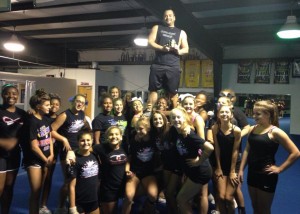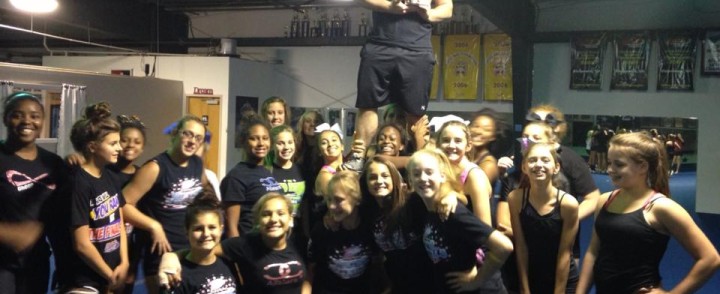Make the Connection: Why Mentoring & Networking Matter
 Love the new USASF junior coaches’ training curriculum? Thank Courtney Kania-Young of Ohio Extreme All-Stars, whose idea sparked the initiative—with a little help from her mentor, Orson Sykes of Twist & Shout.
Love the new USASF junior coaches’ training curriculum? Thank Courtney Kania-Young of Ohio Extreme All-Stars, whose idea sparked the initiative—with a little help from her mentor, Orson Sykes of Twist & Shout.
Hungry for better safety/emergency initiatives? You’ll be appreciative of the work being done by Houston Elite’s Joshua Johnson (mentored by Ann Lehrman) and Karrie Tumelson (mentored by Debbie Love). Johnson’s proposal for Standardized Emergency Action Plans and Tumelson’s recommendations for Universal Safety Standards for the warm-up room will soon be implemented at USASF events during the 2014-2015 season.
These efforts are part of “Leadership USASF: Mentoring Leaders” program, which started in 2011 under Courtney Smith-Pope and continues under Karen Wilson. Each “class” of 12 finalists is selected by the National Advisory Board to participate in this yearlong program and implement new initiatives that they feel are needed in the industry—with the guidance of a high-profile mentor.
It’s all part of an increasing spirit of collaboration and networking permeating the industry, both online and off. For instance, more than 1800 gym owners and cheer professionals are connecting and sharing inside intel and advice on the All-Star Gym Association (ASGA) private Facebook page. No topic is off-limits—from pesky parents to legality questions to questionable vendors. Platinum Athletics coach Kyle Gadke is one of its many active members and testifies it’s been his gym’s “strongest year to date,” thanks in large part to ideas gleaned from the group.
For instance, at last year’s ASGA meeting in Chicago, he was inspired by Ultimate Athletics’ “team shifts” two weeks after tryouts—an approach they’ve implemented at Platinum with great results. The long-time Level 2/Level 5 coach has also used ASGA advice to improve his own Level 1 coaching skills. “I’d never coached Level 1 and didn’t know the rules; thanks to ASGA, I learned how to coach a back walkover,” he laughs. Gadke also relies on his virtual contacts for feedback on competition routines: “If I’m gearing up for a Varsity event, I can talk to ASGA friends and have them evaluate a video to see what we need to improve on.”
Fellow ASGA member Stephanie Kennedy agrees. Since her gym, Panther Cheer Athletics, is based in Richmond (a suburb of Vancouver, BC), she says it can be easy to feel isolated and out of touch with the rest of the industry. The ASGA group helps her stay plugged in. “I’m overwhelmed by the amount of support I’ve received by other gym owners and their willingness to share information—everything from lesson plans and videos to business forms,” says Kennedy. “Gym owners need to know the knowledge is out there, and making those connections is the key to growing your business.”
Like Gadke, Kennedy has also made invaluable contacts at cheer conferences. It was at the Varsity Gym Owners Conference in Las Vegas that she and PCA co-owner Dawn Silver first connected with Midwest Cheer Elite’s Tanya Roesel, whom later became an invaluable resource as a business/marketing consultant—helping their gym boost revenue via a hip-hop program along with providing technique and safety training.
Working with Roesel was highly inspiring for the her, Silver and the PCA staff, says Kennedy: “Sharing ideas and connecting with other gym owners give you a sense of validation that you are doing it right, just like the big gyms.”
–Vicky Choy and Jen Jones Donatelli
Visit our blog Thursday for testimonials from cheer pros who strongly believe in the powering of mentoring and networking.








